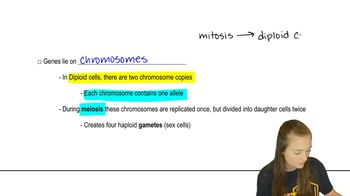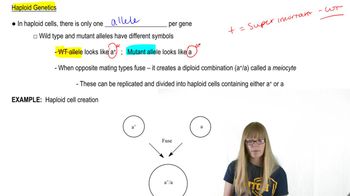Here are the essential concepts you must grasp in order to answer the question correctly.
Homologous Chromosomes
Homologous chromosomes are pairs of chromosomes in a diploid organism that have the same structure and gene sequence, one inherited from each parent. They carry genes for the same traits, but may have different alleles, which are variations of a gene. During meiosis, homologous chromosomes undergo recombination, leading to genetic diversity in gametes.
Recommended video:
Diploidy
Diploidy refers to the condition of having two complete sets of chromosomes, one from each parent, resulting in a total of 46 chromosomes in humans. This genetic arrangement allows for greater genetic variation and stability, as it provides two copies of each gene, which can mask harmful mutations. Diploid cells are typically somatic cells, as opposed to gametes, which are haploid.
Recommended video:
Haploidy
Haploidy is the state of having a single set of unpaired chromosomes, which is characteristic of gametes (sperm and egg cells) in sexually reproducing organisms. In humans, haploid cells contain 23 chromosomes, half the diploid number. This reduction is crucial for sexual reproduction, as it ensures that when two gametes fuse during fertilization, the resulting zygote has the correct diploid chromosome number.
Recommended video:
 Verified step by step guidance
Verified step by step guidance Verified video answer for a similar problem:
Verified video answer for a similar problem:

